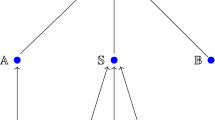Abstract
Scientific knowledge systems function as effective and specialized apparatus for formulating, analyzing and solving scientific problems. In science, problems become internal parts of the knowledge systems; thus they acquire new forms and properties in comparison with common-sense problems. Definite theoretical structures connected with problems and questions appear in the theory. Among them are erotetic expressions and languages, calculi and algebras of problems. On the basis of the structure-nominative reconstruction of a theory, the unified treatment of these structures is given. Methods of the theory of named sets are used in the logical analysis of problems and their systems. As a consequence a new formalized model of the problem part of theory is constructed.
Similar content being viewed by others
References
Balzer, W., C. U. Moulines, and J. D. Sneed: 1987,An Architectonic for Science, D. Reidel, Dordrecht.
Belnap, N. and T. Steel: 1976,The Logic of Questions and Answers, Yale University Press, New Haven and London.
Bromberger, S.: 1988, ‘Rational Ignorance’,Synthese 74(1), 47–64.
Burgin, M.: 1984, ‘Named Sets and Information Representation’,The 8th All-Union Conference on Mathematical Logic, Novosibirsk.
Burgin, M.: 1986, ‘Operations over Named Sets’,Ordered Sets and Lattices, Saratov, pp. 3–12.
Burgin, M.: 1987, ‘Functor Semantics in Named Set Categories’,Rationality, Discourse, Communication, Naukova Dumka, Kiev, pp. 183–198.
Burgin, M.: 1988, ‘Arithmetical Hierarchies and Inductive Turing Machine’,Soviet Math. 299, 3.
Burgin, M.: 1990, ‘Theory of Named Sets as a Foundational Basis for Mathematics’, in A. Diez, J. Echeverria and A. Ibarra (eds.),Structures in Mathematical Theories, San Sebastian, pp. 417–420.
Burgin, M.: 1991a, ‘Independent Exposition of Named Set Theory’,Abstracts of Papers Presented to the American Mathematical Society 12, 384.
Burgin, M.: 1991b, ‘What the Surrounding World Is Built of?’,Filosofska and Sociologichna Dumka 8, 54–67.
Burgin, M. and V. Kuznetsov: 1987a, ‘A Scientific Theory and Its Logico-Linguistic Subsystem’,Filosofskie Nauki 5, 36–45.
Burgin, M. and V. Kuznetsov: 1987b, ‘Operational Aspects of Scientific Theories’,Rationality, Discourse, Communication, Naukova Dumka, Kiev, pp. 126–141.
Burgin, M. and V. Kuznetsov: 1987c, ‘Scientific Theory and Its Axiology’,Abstracts of the 8th International Congress of Logic, Methodology and Philosophy of Science 4(1), 116–118.
Burgin, M. and V. Kuznetsov: 1987d, ‘Problems as Components of the Problem-Heuristical Subsystem of a Scientific Theory’,Scientific Knowledge: Logic, Concepts, Structure, Nauka, Novosibirsk, pp. 52–83 (In Russian).
Burgin, M. and V. Kuznetsov: 1988, ‘Problems in Scientific Theory Structure’,Non-Classical Logic and Propositional Attitudes, Moscow, pp. 101–109.
Burgin, M. and V. Kuznetsov: 1989a, ‘The Problem-Heuristical Subsystem’,Methodological Consciousness in Modern Science, Naukova Dumka, Kiev, pp. 280–309.
Burgin, M. and V. Kuznetsov: 1989b, ‘A Logico-Linguistic Subsystem’,Methodological Consciousness in Modern Science, Naukova Dumka, Kiev, pp. 199–122.
Burgin, M. and V. Kuznetsov: 1989c, ‘A Model Subsystem’,Methodological Consciousness in Modern Science, Naukova Dumka, Kiev, pp. 222–257.
Burgin, M. and V. Kuznetsov: 1991,The Axiological Aspects of Scientific Theories, Naukova Dumka, Kiev.
Burgin, M. and V. Kuznetsov: 1992a, ‘A System Analysis of Problem Aspects of Scientific Theories’,System Research. Yearbook, 1991, Nauka, Moscow, pp. 162–183.
Burgin, M. and V. Kuznetsov: 1992b ‘Model Part of a Scientific Theory’,Epistemologia 15, 98–125.
Carlson L.: 1988, ‘Quantified Hintikka-Style Epistemic Logic’,Synthese 74(2), 223.
Dillon, J. T.: 1988, ‘Questioning in Science’, In M. Meyer (ed.)Questions and Questioning, De Gruyter, New York.
Ershov, Yu, K. Samochvalov: 1984, ‘On a New Approach to the Philosophy of Mathematics’,Computing Systems 101, 141–148.
Garrison, J. W.: 1988, ‘Hintikka, Laudan and Newton: An Interrogative Model of Scientific Discovery,Synthese 74(2), 45–172.
Hand, M.: 1988, ‘Game-Theoretical Semantics, Montague Semantics, and Questions’,Synthese 74(2), 207–222.
Hintikka, J.: 1976, ‘The Semantics of Questions and the Questions of Semantics’,Acta Philosophica Fennica 28, 4.
Hintikka, J.: 1988, ‘What is the Logic of Experimental Inquiry?’,Synthese 74(2), 173–190.
Kleiner, S. A.: 1988, ‘Erotetic Logic and Scientific Inquiry,Synthese 74(1), 19–46.
Kolmogorov, A.: 1932, ‘Zur Deutung der Intuitionistischen Logik’,Math. Ztschr 34, 58–65.
Koura A.: 1988, ‘An Approach to Why-Questions’,Synthese 74, 191–207.
Kuznetsov, V.: 1982, ‘The Understanding as Constituting Factor of Physical Theory Development’, inThe Understanding as Logico-Linguistic Problem, Naukova Dumka, Kiev, pp. 43–69.
Kuznetsov, V.: 1983, ‘On Theoretical Criteria of Physical Knowledge Novelty’ inWays of Creation of New Knowledge in Modern Science, Naukova Dumka, Kiev, pp. 121–148.
Laudan, L.: 1977,Progress and Its Problems, Berkeley: University of California.
Lobovikov, V.: 1984, ‘Scientific Theory as a System of Statements, Problems and Intentions’ inAnalysis of the Scientific Cognition System, Sverdlovsk, pp. 54–58.
Meyer, M.: 1988, ‘The Revival of Questioning in the Twentieth Century,Synthese 74(1), 5–18.
Pearce, D. and V. Rantala: 1981, ‘On a New Approach to Metascience’,Reports of the Department of Philosophy, University of Helsinki, 1.
Scientific Methods as a Problem—Solving and Question—Answering Technique,Synthese 1981,47, 1.
Sneed, J. D.: 1971, 1979,The Logical Structure of Mathematical Physics’, D. Reidel, Dordrecht.
Suppe, F. (ed.): 1974, 1979,The Structure of Scientific Theories, University of Illinois Press, Urbana.
Thagard, P.: 1988,Computational Philosophy of Science, A Bradford Book, Cambridge.
Zytkow, J. and H. A. Simon: 1988, ‘Normative Systems of Discovery and Logic of Search,Synthese 74(1), 65–106.
Author information
Authors and Affiliations
Rights and permissions
About this article
Cite this article
Burgin, M., Kuznetsov, V. Scientific problems and questions from a logical point of view. Synthese 100, 1–28 (1994). https://doi.org/10.1007/BF01063918
Issue Date:
DOI: https://doi.org/10.1007/BF01063918




